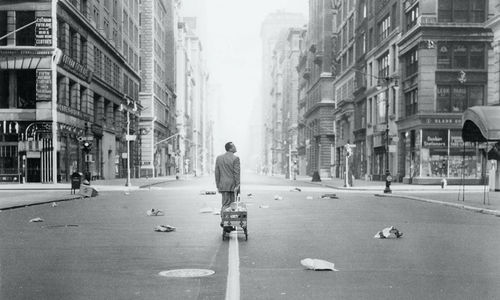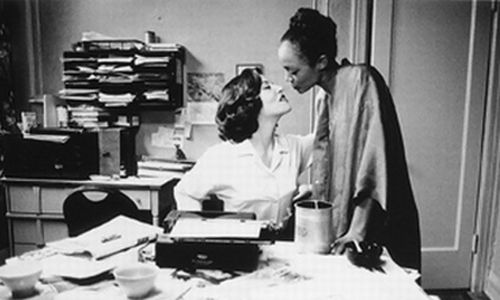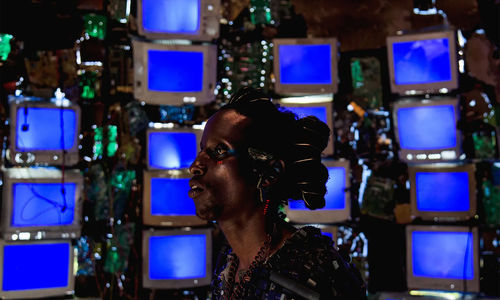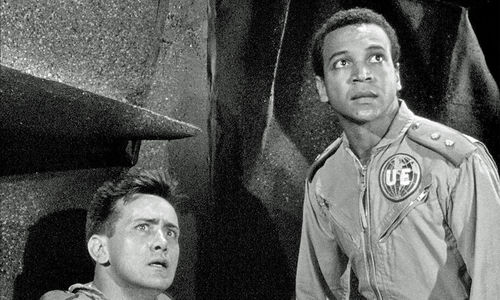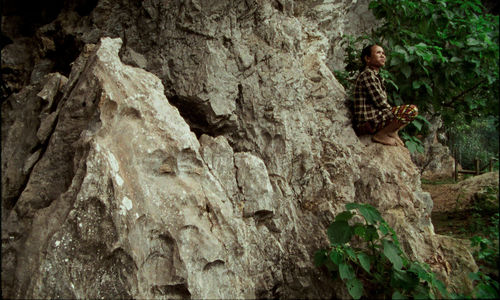
An Evening With Larissa Sansour
- This is a past program
Presented by the UCLA Film & Television Archive.
Part of the UCLA Film & Television Archive screening series Science Fiction Against the Margins. Learn more at cinema.ucla.edu.
In-person: Q&As with filmmaker Larissa Sansour (before and after Familiar Phantoms) and author and UCLA School of Theater, Film and Television Distinguished Professor Chon Noriega.
Born in East Jerusalem, Palestine, and currently based in London, interdisciplinary artist Larissa Sansour creates works that examine the collective memory and trauma of the Palestinian people through allegorical and experimental science fiction films. Sansour works closely with her partner, Danish filmmaker and writer Søren Lind, co-directing and writing most of their films. Their works can be comical and/or dark, but always speak to the current political climate and push against unquestioned mainstream narratives. Our closing night screening includes the three films in Sansour’s science fiction trilogy — A Space Exodus (2009), Nation Estate (2013) and In the Future They Ate From the Finest Porcelain (2015) — along with her follow-up science fiction film In Vitro (2019). Though varied in aesthetic and approach, the films relate to one another in their examination of inherited history and identity, trauma and resistance.
In the Future They Ate From the Finest Porcelain (2015)
Guided by a therapist-like voice, a self-proclaimed “narrative terrorist” recounts her dreams. In one dream, porcelain plates adorned with the traditional Keffiyeh print gently drop from the sky until they begin to catapult down dangerously. The narrator divulges to her therapist (or interrogator?) her plan to bury the DNA-coated plates for archaeologists to find in the future, falsifying proof of a people’s past existence. Sansour combines science fiction, politics and archaeology in her third sci-fi film to allude to current practices used to prove (or disprove) a people’s existence. In still and slow-panning shots, the uncanny dystopia visualized here probes into who gets to be the narrator of history. Combining images of past and future, archival and CGI, dead and living, the film poses the question: what is the future for a people denied their past?
DCP, color, in Arabic with English subtitles, 29 min. Directors: Larissa Sansour, Søren Lind. Screenwriter: Søren Lind. With: Pooneh Hajimohammadi, Anna Aldridge, Leyla Ertosun.
In Vitro (2019)
An eco disaster in Bethlehem reminiscent of the 1948 Nakba forces survivors out of their homes and into a new life underground. Two women meet in a bunker beneath the city’s streets. The elder of these holds lived memories while the younger’s memories were implanted. Thus, the basis for a set of arguments between two generations: Are the inherited memories as valid as lived ones? Can our identities be rooted in memories we didn’t experience firsthand; that is to say, in memories passed on by our ancestors? Originally commissioned for the 58th Venice Biennale, the two-channel black-and-white video switches focus between the younger woman, Alia, played by Maisa Abd Elhadi, and the elder Dunia, played by prolific Palestinian actor Hiam Abbass, as they discuss what can and should be rebuilt.
DCP, b&w, in Arabic with English subtitles, 28 min. Directors: Larissa Sansour, Søren Lind. Screenwriter: Søren Lind. With: Hiam Abbass, Maisa Abd Elhadi, Walaa Eltiti.
DCP, color, 16 min. Director: Emily Drummer.
Nation Estate (2013)
Sansour’s dark sense of humor comes out most fully in Nation Estate. The film offers a solution to the deadlock in the Middle East: permit Palestinian statehood within a skyscraper, the Nation Estate. By stacking one Palestinian city on top of another — one floor for Jerusalem, one for Sansour’s childhood home of Bethlehem, etc. — the fight for land is no longer an issue. Vertical living allows Palestinians to access their cultural landmarks via elevator without getting in the way of the rulers. Luxury living and freedom are packaged into a controlled and constrained environment. A pregnant woman stares out the Nation Estate window at the real Al-Aqsa. The film induces a sad chuckle.
DCP, English audio, color, 10 min. Director: Larissa Sansour. Screenwriter: Søren Lind. With: Larissa Sansour, Leila Sansour, Maxim Sansour.
A Space Exodus
Perhaps Sansour’s most pointed work, A Space Exodus shows a Palestinian astronaut reaching the moon through recreated scenes from the first moon landing and Stanley Kubrick’s 1968 film 2001: A Space Odyssey. The theme from 2001, Richard Strauss’ “Also sprach Zarathustra,” signals the event as recognizable, but when arabesque sounds join the melody, the juxtaposition between image and sound is brought to the foreground. As the astronaut (Sansour herself) plants the Palestinian flag on the moon, the orator back on Earth says, “a small step for a Palestinian, a giant leap for mankind.” This satirical film’s iconic images frame the colonization of outer space in a nonsensical manner as our astronaut floats off farther and farther from the call to Jerusalem.
DCP, English audio, color, 5 min. Director/Screenwriter: Larissa Sansour. With: Larissa Sansour.
Familiar Phantoms (2023)
“I know far too well that memory is a rogue agent.”—Familiar Phantoms
Familiar Phantoms is the most personal project yet for Larissa Sansour who co-directed the film with her partner Søren Lind, the film’s screenwriter. Revisiting family anecdotes, objects and spaces, Familiar Phantoms considers what it means to remember, and what it means to remember something that didn’t happen to you. Told through theatrically staged vignettes starring Sansour’s siblings as her father and aunt (Maxim Sansour and Leila Sansour), the recreated scenes attempt to bring life to tales Sansour was told as a child. Though vibrant in color, the memories are just as cloudy as anything else we’re told as children, at times debunked when conflicting facts and dates are proven.
The film combines Super 8 archival footage from Sansour’s childhood in Bethlehem with the sharp reenacted scenes and ghostly moving shots down a large home’s hallways and rooms — the stand-in for their family home in Bethlehem. The film switches between full screen to dual screen, making visual connections between the past and present. Sansour searches for explanations for the loss of a home in Palestine through clues in the family objects that remain, and the home movies shot by her parents. Self-reflective in form, Familiar Phantoms winds the viewer through the stages of remembering, forgetting and searching for meaning in what’s left. Whenever Sansour leaves Bethlehem, she has the feeling that she’s left something behind.
DCP, color, in Arabic with English subtitles, 40 min. Directors: Larissa Sansour, Søren Lind. Screenwriter: Søren Lind. With: Sofia Asir, Sofie Baldgiev, Leila Sansour, Maxim Sansour.
The UCLA Film & Television Archive is a division of UCLA Library, and presents its public programs in the Billy Wilder Theater at the Hammer, among other venues. For more information about the Archive, visit cinema.ucla.edu.
ATTENDING THIS PROGRAM?
Ticketing: Admission to Archive screenings at the Hammer is free. Your seat will be assigned to you when you pick up your ticket at the box office. Seats are assigned on a first come, first served basis, limit one per visitor. Box office opens one hour before the event. Questions should be directed to the Archive at programming@cinema.ucla.edu or 310-206-8013.
Member Benefit: Subject to availability, Hammer Members can choose their preferred seats and pick up tickets for one additional guest. Members receive priority ticketing until 15 minutes before the program. Learn more about membership.
Parking: Self-parking is available under the museum. Rates are $8 for the first three hours with museum validation, and $3 for each additional 20 minutes, with a $22 daily maximum. There is an $8 flat rate after 5 p.m. on weekdays, and all day on weekends.
Read our food, bag check, and photo policies.
Read our COVID-19 safety guidelines.





